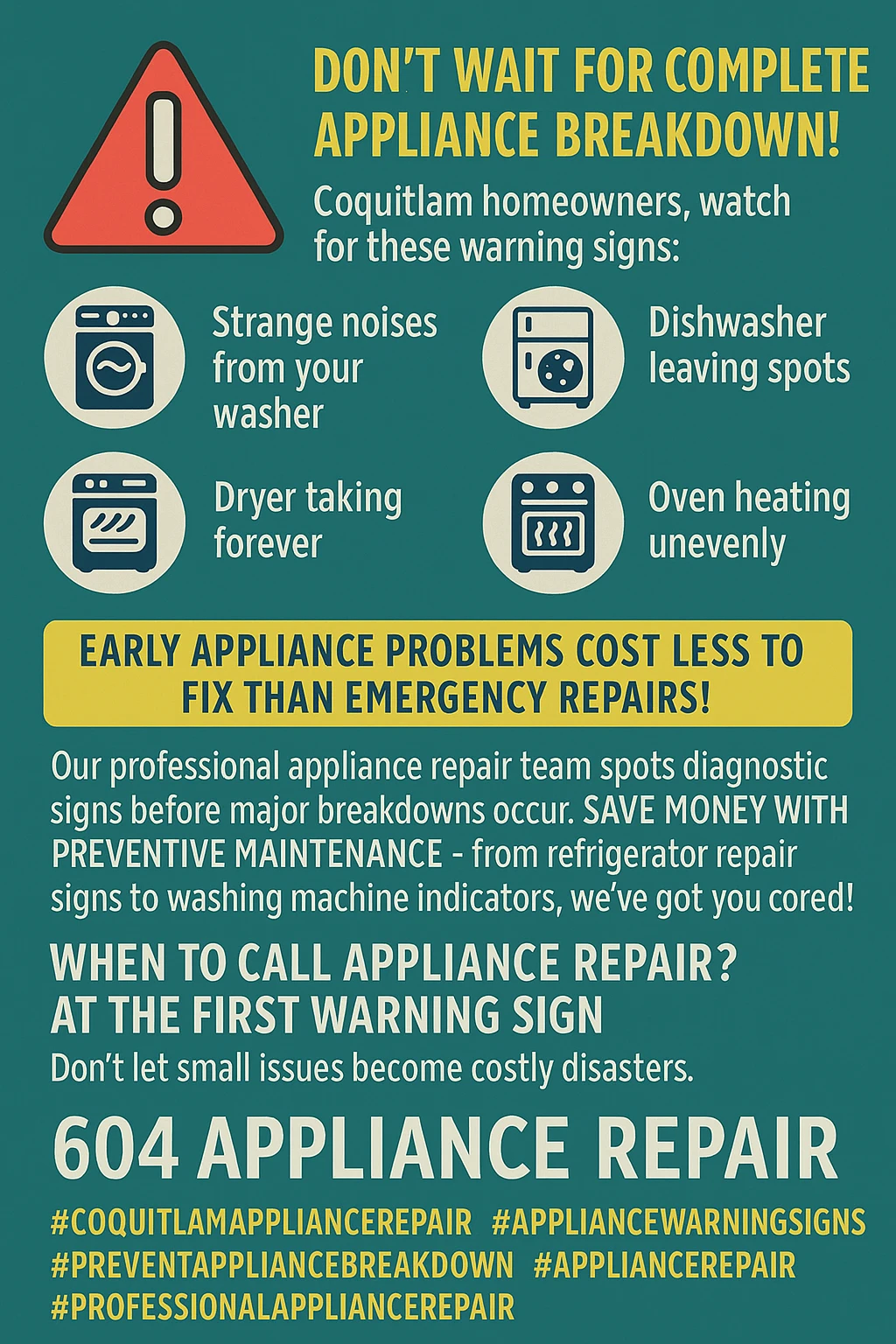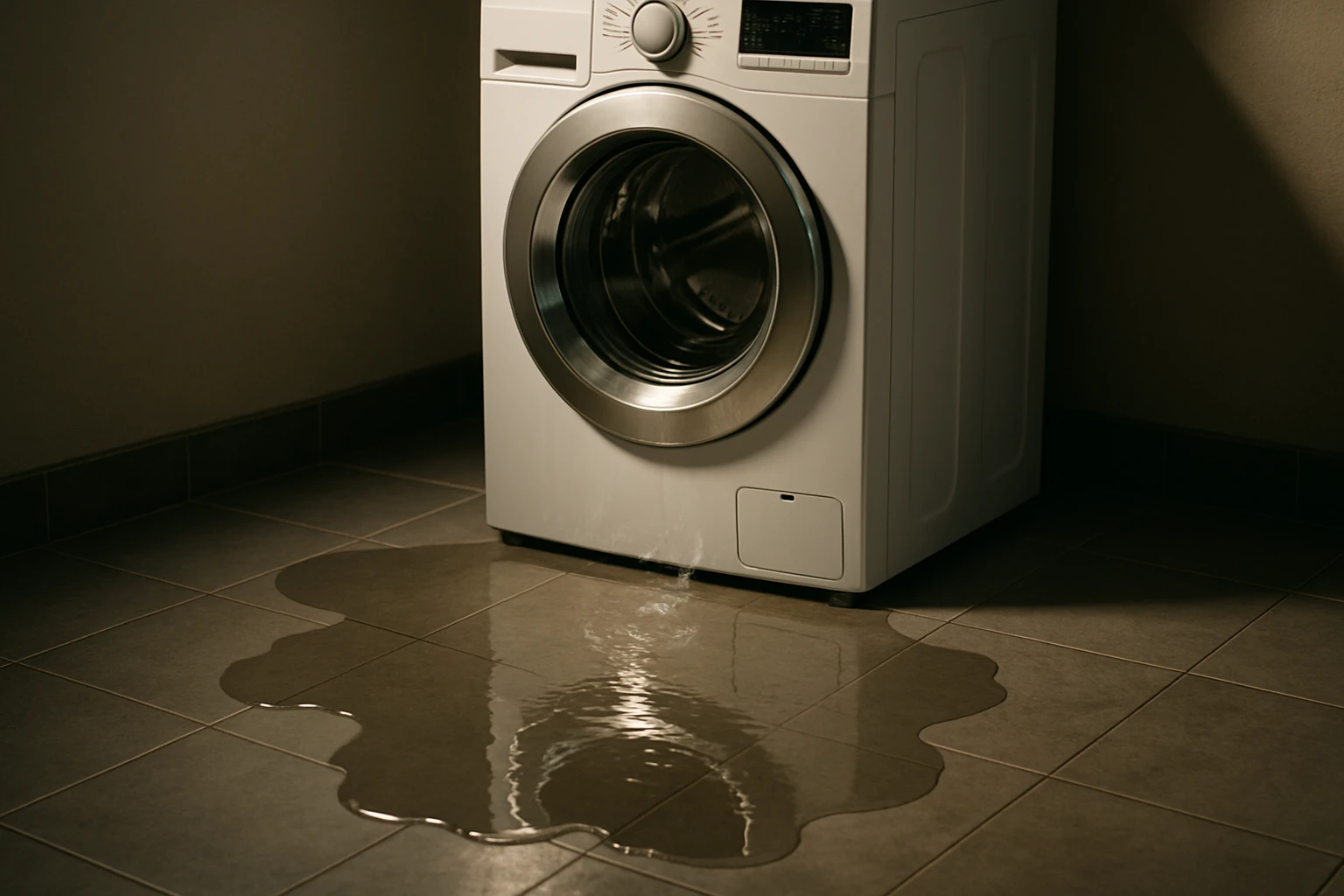Signs Your Appliances Need Professional Repair Before They Break Down Completely: A Coquitlam Homeowner’s Prevention Guide
Tired of dealing with appliance surprises that throw your whole week off track? Let’s dive into the telltale signs that your home’s hardest-working machines are crying out for help before they completely give up on you.
Picture this: you’re rushing to get ready for work, and suddenly your coffee maker starts making that weird grinding noise again. Or maybe your dishwasher has been leaving spots on your glasses for weeks, but you keep telling yourself it’s just a phase. Sound familiar? We’ve all been there, playing the “maybe it’ll fix itself” game with our appliances. But here’s the thing – your appliances are actually pretty chatty when something’s wrong, and learning their language can save you from those dreaded emergency repair calls.
As homeowners in Coquitlam, we rely heavily on our appliances to keep our daily routines running smoothly. From the morning coffee ritual to the late-night laundry loads, these machines work tirelessly behind the scenes. But just like any hardworking team member, they need a little TLC to keep performing at their best. The good news? Most appliances give us plenty of warning signs before they completely break down.
Recognizing these early warning signals isn’t just about avoiding inconvenience – it’s about protecting your investment and preventing those budget-busting emergency repairs. When you catch problems early, you’re looking at simple fixes rather than complete replacements. Plus, well-maintained appliances run more efficiently, which means lower energy bills and a smaller environmental footprint.
Key Outtakes:
- Strange noises, unusual vibrations, and inconsistent performance are your appliances’ way of asking for help
- Early intervention typically costs 60-80% less than emergency repairs or full replacements
- Regular maintenance and prompt attention to warning signs can extend appliance lifespan by 3-5 years
- Professional diagnosis can identify multiple issues during one service call, saving time and money
- Coquitlam’s climate conditions can accelerate certain appliance problems, making preventive care even more crucial

Understanding Your Appliances’ Warning System
Think of your appliances as really expensive pets that can’t bark or meow when something’s wrong. Instead, they communicate through sounds, smells, and performance changes that might seem random but actually follow pretty predictable patterns. Every gurgle, clank, and hiccup is part of their unique vocabulary, and once you learn to speak “appliance,” you’ll wonder how you ever missed these obvious cries for help.

The beauty of modern appliances is that they’re designed with built-in warning systems. Your refrigerator doesn’t just suddenly stop cooling one day – it usually gives you weeks or even months of subtle hints. Maybe the motor runs a little longer than usual, or you notice slight temperature fluctuations. These aren’t just quirks; they’re your fridge’s way of saying, “Hey, I’m working harder than I should be over here!”
Understanding these warning signs puts you in the driver’s seat of home maintenance. Instead of being reactive – waiting for complete breakdowns and scrambling for emergency repairs – you become proactive. This shift in mindset can literally save you thousands of dollars over the life of your appliances. Professional technicians in Coquitlam consistently report that homeowners who address issues early spend significantly less on repairs and enjoy much longer appliance lifespans.
Kitchen Appliance Warning Signs
Your kitchen is command central for daily life, and when appliances start acting up here, you feel it immediately. The refrigerator is often the first to show signs of distress, and trust me, you don’t want to ignore these signals. Temperature inconsistencies are huge red flags – if your milk is spoiling faster than usual or your freezer isn’t keeping ice cream properly frozen, your refrigerator is working overtime trying to compensate for a failing component.
Listen for changes in your refrigerator’s normal hum. A healthy fridge has a consistent, gentle sound cycle. If you start hearing loud clicking, grinding, or constant running, something’s definitely up. The condenser coils might be dirty, the compressor could be struggling, or the door seals might be compromised. These issues seem small, but they can lead to complete system failure if left unchecked.
Your dishwasher is another chatty appliance that gives plenty of warning before major problems develop. Strange noises during the wash cycle, like grinding or squealing, often indicate worn pump seals or damaged spray arms. If dishes come out still dirty or with strange residue, the problem might be deeper than just needing rinse aid. Water temperature issues, clogged filters, or failing heating elements can all manifest as poor cleaning performance.

Don’t overlook your garbage disposal – it’s one of the hardworking appliances that often gets taken for granted until it stops working. If it’s making unusual grinding noises, taking longer to process food waste, or emitting unpleasant odors despite regular cleaning, these are clear signs that internal components are wearing down. A professional can often resolve these issues with simple repairs, but waiting too long might require a complete replacement.
Your oven and stovetop deserve attention too. Uneven cooking, longer preheating times, or inconsistent burner performance all point to potential problems. Gas appliances especially need professional attention at the first sign of trouble – unusual odors, yellow flames instead of blue, or difficulty lighting are serious safety concerns that require immediate professional evaluation.
Laundry Room Red Flags
Moving into the laundry room, your washing machine and dryer work as a team, but they each have their own vocabulary of warning signs. Your washing machine might be the most expressive appliance in your home, and its signals are usually pretty obvious once you know what to listen for. Excessive vibration during the spin cycle isn’t just annoying – it often indicates an unbalanced load, worn shock absorbers, or problems with the drum bearings.
Water-related issues are particularly important to address quickly. If you notice puddles around your washing machine, don’t just mop them up and hope for the best. Small leaks can indicate worn door seals, loose connections, or problems with the water pump. These issues can escalate rapidly, potentially causing water damage to your floors and surrounding areas. The moisture can also create perfect conditions for mold growth, which becomes a whole different problem.

Your dryer’s warning signs are equally important but sometimes more subtle. If clothes are taking longer to dry, coming out hotter than usual, or you notice a burning smell, these could indicate restricted airflow, clogged vents, or overheating components. Lint buildup is a serious fire hazard, and professional cleaning might be necessary even if you clean the filter regularly.
Strange grinding or squealing noises from your dryer often point to worn drum rollers, damaged drive belts, or problems with the motor. These components typically wear gradually, giving you plenty of warning before complete failure. Professional technicians can often replace these parts individually, which is much more cost-effective than waiting for the entire unit to break down.
Pay attention to your dryer’s cycles too. If it’s not shutting off automatically, running too long, or stopping before clothes are dry, the moisture sensors or control systems might need professional attention. These issues not only waste energy but can also damage your clothes and strain other dryer components.
Climate-Specific Concerns for Coquitlam Homeowners
Living in Coquitlam means dealing with specific climate challenges that can accelerate appliance wear and create unique maintenance needs. Our region’s humidity levels and temperature fluctuations put extra stress on appliances, particularly during seasonal transitions. Understanding these local factors helps you stay ahead of potential problems and schedule preventive maintenance at the right times.
The Pacific Northwest’s moisture levels can be particularly hard on appliances with heating elements or ventilation systems. Your dryer works harder during humid months, and inadequate ventilation can lead to condensation problems throughout your home. This excess moisture can affect electrical components, promote rust in metal parts, and create ideal conditions for mold growth in hard-to-reach areas. Professional technicians familiar with local conditions can help you identify and address these moisture-related issues before they become serious problems.
Temperature swings also affect appliance performance in ways that might not be immediately obvious. Your refrigerator and freezer work harder during hot summer months, while heating appliances face increased demand during our chilly winters. These seasonal stress patterns can reveal weaknesses in aging components, making fall and spring ideal times for preventive maintenance checks.
Local appliance repair services report that certain problems are more common in our region. Drainage issues affect dishwashers and washing machines more frequently due to our area’s mineralized water. Scale buildup can reduce efficiency and damage internal components over time. Regular maintenance and water treatment solutions can address these regional challenges before they lead to expensive repairs.
Our local electrical grid characteristics can also impact appliance longevity. Power fluctuations, while generally minor, can stress electronic control systems over time. Surge protectors and voltage regulators can help protect your investment, especially for high-end appliances with sophisticated digital controls.
The Economics of Early Intervention
Let’s talk numbers because this is where preventive maintenance really shines. The average cost of emergency appliance repair in Coquitlam ranges from $150 to $400 per service call, not including parts and labor. Compare that to routine maintenance visits that typically cost $80 to $120 and can prevent multiple problems from developing. Even better, many issues caught early can be resolved with simple adjustments or minor part replacements costing under $50.
Consider the real cost of appliance failure beyond just repair expenses. A broken refrigerator means spoiled food, potentially costing $200 to $500 in groceries. A failed washing machine during a busy week might force you to use expensive commercial laundry services. These hidden costs add up quickly and can easily exceed the price of regular maintenance.
Professional technicians often identify multiple minor issues during routine service calls. This bundled approach to maintenance is incredibly cost-effective because you’re paying for the service visit once while addressing several potential problems. Many homeowners are surprised to learn that their appliances had three or four small issues that were easily fixed during a single appointment.
The resale value factor is worth considering too. Well-maintained appliances with documented service histories are significant selling points for potential buyers. Real estate agents consistently report that homes with newer, well-maintained appliances sell faster and command higher prices. This maintenance investment literally pays for itself when you decide to sell your home.
Extended warranties and manufacturer guarantees often require regular professional maintenance to remain valid. Skipping preventive care might void these protections, leaving you fully responsible for repair costs that could have been covered. Professional maintenance creates a paper trail that protects your warranty rights and demonstrates responsible ownership.
Frequently Asked Questions
How often should I have my appliances professionally serviced?
Most appliances benefit from annual professional maintenance, but the schedule can vary based on usage and age. High-use appliances like dishwashers and washing machines might need attention every 6-8 months, while refrigerators and dryers typically do well with yearly service. If your appliances are over 8 years old, consider increasing the frequency to every 6 months. Professional technicians can provide personalized maintenance schedules based on your specific appliances and usage patterns.
What should I do if I notice multiple warning signs at once?
Multiple warning signs often indicate a systematic problem that requires immediate professional attention. Don’t try to address several issues yourself – this usually indicates that components are failing in sequence, and professional diagnosis is essential. Turn off the affected appliance and contact a qualified technician right away. Continuing to use an appliance with multiple warning signs can lead to safety hazards and much more expensive repairs.
Are there any warning signs that indicate immediate safety concerns?
Yes, certain warning signs require immediate action and professional attention. These include any burning smells, electrical sparking, gas odors, excessive heat, water leaks near electrical components, or unusual electrical behavior like flickering lights when appliances start. If you notice any of these signs, stop using the appliance immediately and contact a professional technician. These issues can pose serious safety risks and should never be ignored or treated as minor problems.
Wrapping Up
Your appliances are constantly communicating with you, and learning their language is one of the most valuable skills you can develop as a homeowner. Those weird noises, slight performance changes, and occasional hiccups aren’t just random quirks – they’re your appliances’ way of asking for help before small problems become big disasters. By staying tuned in to these warning signs and responding proactively, you’re not just maintaining your appliances; you’re protecting your investment, your comfort, and your peace of mind.
The key to successful appliance maintenance is shifting from reactive to proactive thinking. Instead of waiting for complete breakdowns, you become the detective who spots clues early and takes action. This approach saves money, prevents inconvenience, and often extends appliance life well beyond normal expectations. Remember, every appliance repair professional will tell you the same thing: the customers who spend the least on repairs are the ones who address issues promptly.
Don’t let appliance anxiety control your household routine. With the right knowledge and a trusted professional relationship, you can keep your home running smoothly year-round. Your future self will thank you for the emergency calls avoided, the money saved, and the stress prevented. Start listening to your appliances today – they’ve got a lot to say, and most of it is really good news about simple problems with simple solutions.
